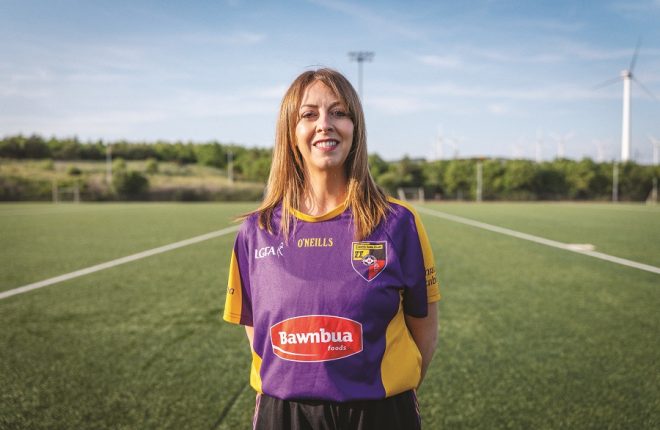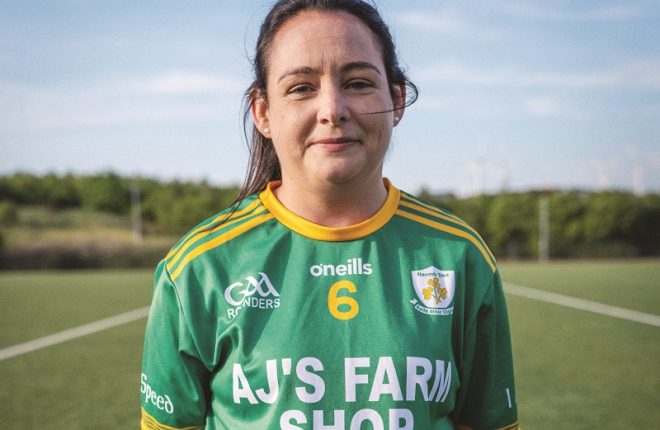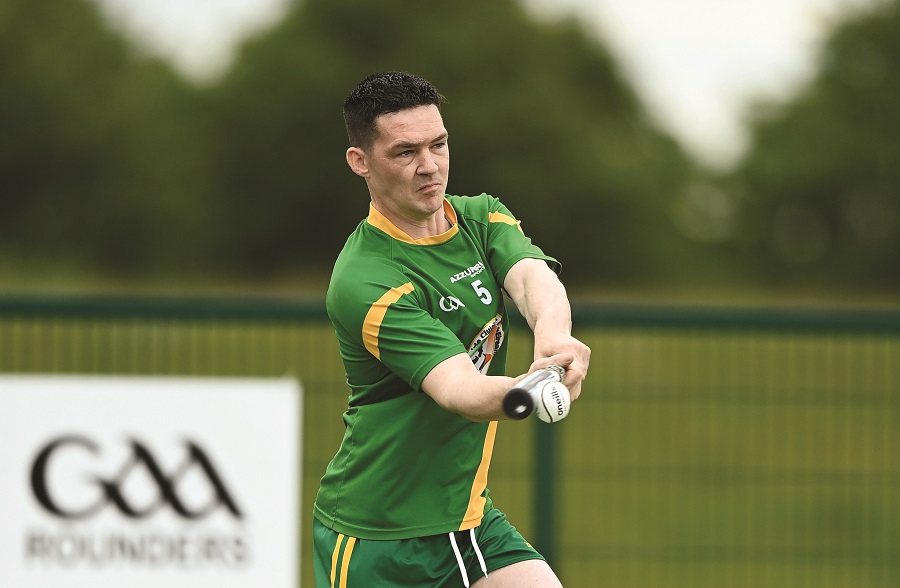We take a look at the unheralded sport of rounders and why its participants find it such an enjoyable social outlet. Niall Gartland writes…
YOU may have given rounders a crack in the back garden as a child but chances are that’s about the height of it.
It’s easy to forget (if you were actually aware in the first place) it’s actually a fully codified part of the GAA, founded, by the way, in 1884 along with Gaelic football, hurling and handball.
Played under a separate governing body in England, it’s also generally acknowledged that baseball is derived from rounders in some form or other, with the game brought over to America by the early settlers.
While it’d be a stretch to say that the sport is completely flourishing in Ireland, two of its strongest clubs are located in Ulster (Cavan-based Erne Eagles, an amalgamation of Mullahoran, Ballymachugh, and Cuchulainn’s and Monaghan side Carrickmacross) while other clubs are starting to spring up hither and thither.
For many it’s predominately a social outlet with integration at its core – mixed teams of men and women are commonplace – but like the other codes in the GAA, there are All-Ireland titles up for grabs that are ferociously competed for.
So if there’s a club in your locality, why not give it a go? We’ve had a chat with a few of its participants to find out more about the game and why they decided to get involved.
Ronan Kiernan (Carrickmacross)
CARRICKMACROSS have one of the strongest rounders teams in the country and won a historic All-Ireland Men’s title in 2020. One of their most experienced players is Ronan Kiernan, who also helps manage the team, and he explains how things have snowballed since they took up the sport back in 2015.
“A few of us gave it a go via community games years ago but we never looked into the more serious aspect of it, but in 2015 a couple of us decided to give it a go.
“In the first couple of years we found it a bit tough as we didn’t realise how many established clubs there were outside of Ulster. But things exploded for us and by 2020 we were one of the best teams in Ulster and we now have a ladies, mixed and second mixed team as well.
“One of the important things for us is participation and that’s why it’s crucial to have a few different teams on the go across senior, intermediate and junior level, it’s something that everyone can get involved in without going into the high stakes of a senior competition.
“When you’re married and have children, you mightn’t have the time to play football for example but I can train twice a week with rounders rather than having to dedicate four or five days a week. It’s a bit more inclusive in that respect but I wouldn’t go as far as saying it’s not taken seriously, because it is.”
The sport is relatively easy to take up, especially for those already involved in sports that entail a high level of hand-eye coordination. Those transferable skills make it a particular draw for handballers and hurlers, as Kiernan explains.
“A nephew of mine on the team played in a Monaghan Senior Hurling final, A Monaghan Senior Football final, he’s won a Junior ‘B’ All-Ireland in handball and an All-Ireland Senior title in rounders, there’s not many out there who can boast something like that.
“There’s a lot of hurlers and handballers on the team and that’s a bit of a trend, there’s a few lads playing in a Carlow club that recently won the Joe McDonagh Cup with their hurlers for example.”
In terms of what the sport entails, you’ll already have an idea – the game is played with baseball-sized bats and a sliotar in a field (70 square metres to be precise). Gameplay comprises a number of innings in which teams alternate at batting and fielding and nine players constitute a team between the bowler, catcher, a player on each of the four bases and three deep fielders. It’s easy to participate but difficult to master, comments the established Carrick man.
“The toughest thing is just finding someone who can pitch from 12 metres. It looks easy, that you can just lob it in, but the rule is that the ball has to go between the shoulder and the knee and that’s difficult for a newcomer. You could take 50 people out to a field and you’ll possibly only get one person who can do it properly on a consistent basis. That’s probably the biggest learning curve and as the saying goes, ‘no bowler no game.’
“Everyone loves batting but that’s a lot tougher than people think as well, with people flinging the ball at you.”
He also says that they get a lot of support from the club and that in that sense there’s no hierarchy between the codes.
“To be honest I find our club always lets us get on with things. The best thing is to have a sub-committee within the GAA club itself, so you can take care of your own stuff, but we also use the pitch, the dressing rooms and everything like that. Anything we ask for, we always get it. A lot of the clubs involved in rounders come in under the one-club model and it ultimately brings in more members.”
Siobhan Quinn (Carryduff)
FOR Carryduff club member Siobhan Quinn, rounders is very much a social outlet. She brings her kids along to training in the evenings, and no longer is it simply a matter of being a chauffeur, as she explains.
“With children already involved in every aspect of the club, I thought ‘why not give it a go’. It’s brilliant as my kids get to play in the club while I’m involved with rounders, I’m a widow and it’s nice to be able to do something myself rather than constantly running to pitches with them.”
A native of Creggan outside Carrickmore in County Tyrone, Quinn isn’t the only ‘blow in’ at the thriving Carryduff club on the outskirts of Belfast. There’s a real feel-good factor in Carryduff and it’s no surprise they’re embracing a new code.
“The club is phenomenal, it’s a hive of activity every day of the week and the numbers at underage level are incredible between nursery, u-8, u-10, the boys and girls and so on.

REWARDING…Carryduff’s Siobhan Quinn enjoys playing Rounders with her friends
“We train every Sunday morning at 11am and even then all the pitches are nearly taken. It’s hard to get a space sometimes but it’s a wonderful club to be a part of.
“When rounders first started up in Carryduff, we’d a lot of people interested but numbers fell off as there was a lot of talk about being involved in an All-Ireland series and I think it deterred people a bit.
“So we took ourselves out of the All-Ireland and we’re just doing it for the social aspect of playing together. We’ve a local MP who’s now involved, Claire Hanna, she’s rocked up every Sunday so far which is brilliant.
“We’re focusing on getting as many people involved for the social aspect as possible, getting a lot more men involved as well. It’s a real family thing with husbands and wives involved, older children can play the sport as well.
“It’s just great to be part of the community and club, and playing with some of my friends. I’ve been trying to get as many people on board as possible as I’m getting a lot out of rounders personally.”
She also hopes that between word of mouth and a bit more press attention, that more clubs will spring up in the vicinity. And who knows, it mightn’t be long before they’re involved in the big competitions.
“I played rounders as a kid, who didn’t really, and it was always a thoroughly enjoyable game and it’s great to play it again and to get to know the rules properly.
“Hopefully it can be pushed forwards in other clubs. It was initially a big drawback for us when we got involved in the All-Ireland that so many of the other clubs are quite far away geographically and we’d have to do quite a lot of travelling, but hopefully more nearby clubs will start to become interested. Word of mouth is the best way to spread information and news and hopefully with a bit more publicity, it’ll become a more established sport.”
Michelle Cassidy (St Treas, Ballymaguigan)
MICHELLE Cassidy plays on the Ballymaguigan team alongside her husband David, and that family feel is one of the most special things about rounders.
Rounders is still fairly new to the club which produced, among others, legendary Derry figure Eamonn Coleman, but they’ve taken it to their heart. Cassidy, who played ladies football earlier in her career, has now taken up rounders and she’s enjoying the experience.
“I played rounders socially years ago and so did my husband so we decided we’d join up. It’s great craic and this is our third summer now. We were thrown into a tournament in Dublin, I think we’d only trained for two weeks at that stage, but it was great fun and we learnt a lot. The boys came home with medals so we didn’t do too badly.”

GIVE IT A TRY…Michelle Cassidy from Ballymaguigan has taken up the sport
St Treas field a Junior mixed and Junior ladies team at present. In time, who knows where they could end up and it helps a lot that the club as a whole are supportive.
“The club as a whole have been great, they get the pitch marked out for us, especially for matches and they push it on social media. It’s great to get that visibility. Hopefully other clubs get involved as well, you need that competition to improve really, but I find a lot of people ask me questions about it, the rules and if it’s similar to baseball so I try to encourage them to join up.”
To sum up, Cassidy emphasises that the great thing about the game is that it’s a such a communal experience.
“There’s around 12-15 on our team, you need a minimum of ten for a match so we have enough. We’ve people as young as 16, there’s a good age range of people involved, there’s mothers and sons, brothers and sisters. That’s what’s so good about it and we all chip in.”
Receive quality journalism wherever you are, on any device. Keep up to date from the comfort of your own home with a digital subscription.
Any time | Any place | Anywhere












